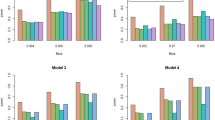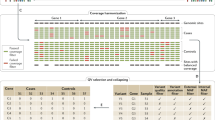Abstract
Increasing evidence shows that one variant can affect multiple traits, which is a widespread phenomenon in complex diseases. Joint analysis of multiple traits can increase statistical power of association analysis and uncover the underlying genetic mechanism. Although there are many statistical methods to analyse multiple traits, most of these methods are usually suitable for detecting common variants associated with multiple traits. However, because of low minor allele frequency of rare variant, these methods are not optimal for rare variant association analysis. In this paper, we extend an adaptive combination of P values method (termed ADA) for single trait to test association between multiple traits and rare variants in the given region. For a given region, we use reverse regression model to test each rare variant associated with multiple traits and obtain the P value of single-variant test. Further, we take the weighted combination of these P values as the test statistic. Extensive simulation studies show that our approach is more powerful than several other comparison methods in most cases and is robust to the inclusion of a high proportion of neutral variants and the different directions of effects of causal variants.





Similar content being viewed by others
References
Aschard H., Vilhjalmsson B. J., Greliche N., Morange P. E., Tregouet D. A. and Kraft P. 2014 Maximizing the power of principal-component analysis of correlated phenotypes in genome-wide association studies. Am. J. Hum. Genet. 94, 662–676.
Bansal V., Libiger O., Torkamani A. and Schork N. J. 2010 Statistical analysis strategies for association studies involving rare variants. Nat. Rev. Genet. 11, 773–785.
Basu S. and Pan W. 2011 Comparison of statistical tests for disease association with rare variants. Genet. Epidemiol. 35, 606–619.
Bodmer W. and Bonilla C. 2008 Common and rare variants in multifactorial susceptibility to common diseases. Nat. Genet. 40, 695–701.
Klei L., Luca D., Devlin B. and Roeder K. 2008 Pleiotropy and principal components of heritability combine to increase power for association analysis. Genet. Epidemiol. 32, 9–19.
Korte A., Vilhjalmsson B. J., Segura V., Platt A., Long Q. and Nordborg M. 2012 A mixed-model approach for genome-wide association studies of correlated traits in structured populations. Nat. Genet. 44, 1066–1071.
Lange C., Van Steen K., Andrew T., Lyon H., Demeo D. L., Raby B. et al. 2004 A family-based association test for repeatedly measured quantitative traits adjusting for unknown environmental and/or polygenic effects. Stat. Appl. Genet. Mol. Biol. 3, 1–27.
Li B. and Leal S. M. 2008 Methods for detecting associations with rare variants for common diseases: application to analysis of sequence data. Am. J. Hum. Genet. 83, 311–321.
Lin W.-Y., Lou X.-Y., Gao G. and Liu N. 2014 Rare variant association testing by adaptive combination of \(P\)-values. PLoS One 9, e85728.
Madsen B. E. and Browning S. R. 2009 A groupwise association test for rare mutations using a weighted sum statistic. PLoS Genet. 5, e1000384.
Maher B. 2008 Personal genomes: the case of the missing heritability. Nature 456, 18–21.
Manolio T. A., Collins F. S., Cox N. J., Goldstein D. B., Hindorff L. A., Hunter D. J. et al. 2009 Finding the missing heritability of complex diseases. Nature 461, 747–753.
McCarthy M. I., Abecasis G. R., Cardon L. R., Goldstein D. B., Little J., Ioannidis J. P. et al. 2008 Genome-wide association studies for complex traits: consensus, uncertainty and challenges. Nat. Rev. Genet. 9, 356–369.
Morgenthaler S. and Thilly W. G. 2007 A strategy to discover genes that carry multi-allelic or mono-allelic risk for common diseases: a cohort allelic sums test (CAST). Mutat. Res. 615, 28–56.
Neale B. M., Rivas M. A., Voight B. F., Altshuler D., Devlin B., Orho-Melander M. et al. 2011 Testing for an unusual distribution of rare variants. PLoS Genet. 7, e1001322.
Ng S. B., Turner E. H. and Robertson P. D. 2009 Targeted capture and massively parallel sequencing of 12 human exomes. Nature 461, 272–276.
OBrien P. C. 1984 Procedures for comparing samples with multiple endpoints. Biometrics 40, 1079–1087.
OReilly P. F., Hoggart C. J., Pomyen Y., Calboli F. C., Elliott P., Jarvelin M. R. et al. 2012 MultiPhen: joint model of multiple phenotypes can increase discovery in GWAS. PLoS One 7, e34861.
Ott J. and Rabinowitz D. 1999 A principal-components approach based on heritability for combining phenotype information. Hum. Hered. 49, 106–111.
Price A. L., Kryukov G. V., de Bakker P. I., Purcell S. M., Staples J., Wei L. J. et al. 2010 Pooled association tests for rare variants in exon-resequencing studies. Am. J. Hum. Genet. 86, 832–838.
Pritchard J. K. 2001 Are rare variants responsible for susceptibility to complex diseases? Am. J. Hum. Genet. 69, 124–137.
Pritchard J. K. and Cox N. J. 2002 The allelic architecture of human disease genes: common disease-common variant . . . or not? Hum. Mol. Genet. 11, 2417–2423.
Sattar N., Mcconnachie A., Shaper A. G., Blauw G. J., Buckley B. M., De Craen A. J. et al. 2008 Can metabolic syndrome usefully predict cardiovascular disease and diabetes? Outcome data from two prospective studies. Lancet 371, 1927–1935.
Sha Q., Wang X., Wang X. and Zhang S. 2012 Detecting association of rare and common variants by testing an optimally weighted combination of variants. Genet. Epidemiol. 36, 561–571.
Sivakumaran S., Agakov F., Theodoratou E., Prendergast J. G., Zgaga L., Manolio T. et al. 2011 Abundant pleiotropy in human complex diseases and traits. Am. J. Hum. Genet. 89, 607–618.
Stratton M. R. and Rahman N. 2008 The emerging landscape of breast cancer susceptibility. Nat. Genet. 40, 17–22.
Tang C. S. and Ferreira M. A. 2012 A gene-based test of association using canonical correlation analysis. Bioinformatics 28, 845–850.
Teer J. K. and Mullikin J. C. 2010 Exome sequencing: the sweet spot before whole genomes. Hum. Mol. Genet. 19, R145–R151.
Van Der Sluis S., Posthuma D. and Dolan C. V. 2013 TATES: Efficient multivariate genotype-phenotype analysis for genomewide association studies. PLoS Genet. 9, e1003235.
Visscher P. M., Brown M. A., McCarthy M. I. and Yang J. 2012 Five years of GWAS discovery. Am. J. Hum. Genet. 90, 7–24.
Walsh T. and King M. C. 2007 Ten genes for inherited breast cancer. Cancer Cell 11, 103–105.
Wang Z., Wang X., Sha Q. and Zhang S. 2016 Joint analysis of multiple traits in rare variant association studies. Ann. Hum. Genet. 80, 162–171.
Welter D., MacArthur J., Morales J., Burdett T., Hall P., Junkins H. et al. 2014 The NHGRI GWAS Catalog, a curated resource of SNP-trait associations. Nucleic Acids Res. 42, D1001–D1006.
Wu M. C., Lee S., Cai T., Li Y., Boehnke M. and Lin X. 2011 Rare-variant association testing for sequencing data with the sequence kernel association test. Am. J. Hum. Genet. 89, 82–93.
Yang Q., Wu H., Guo C. Y. and Fox C. S. 2010 Analyze multivariate phenotypes in genetic association studies by combining univariate association tests. Genet. Epidemiol. 34, 444–454.
Yu K., Li Q., Bergen A. W., Pfeiffer R. M. and Rosenberg P. S. 2009 Pathway analysis by adaptive combination of \(P\)-values. Genet. Epidemiol. 33, 700–709.
Zhou X. and Stephens M. 2014 Efficient multivariate linear mixed model algorithms for genome-wide association studies. Nat. Methods 11, 407–409.
Acknowledgements
The Genetic Analysis workshops were supported by GAW grant R01 GM031575 from the National Institute of General Medical Sciences. Preparation of the Genetic Analysis Work-shop 17 Simulated Exome Dataset was supported in part by NIH R01 MH059490 and used sequencing data from the 1000 Genomes Project (http://www.1000genomes.org). This work was conducted in the framework of basic research expenditure of universities in Heilongjiang Province, special fund of Heilongjiang University (no. HDJCCX-201631).
Author information
Authors and Affiliations
Corresponding author
Additional information
Corresponding editor: Kunal Ray
Rights and permissions
About this article
Cite this article
Chen, L., Wang, Y. & Zhou, Y. Association analysis of multiple traits by an approach of combining \(P\) values. J Genet 97, 79–85 (2018). https://doi.org/10.1007/s12041-018-0885-0
Received:
Revised:
Accepted:
Published:
Issue Date:
DOI: https://doi.org/10.1007/s12041-018-0885-0




